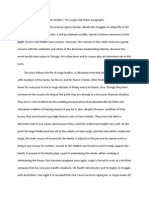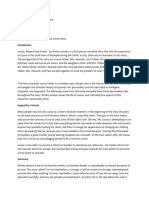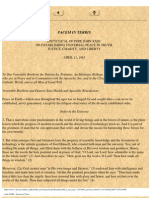The Jungle - An Analysis
The Jungle - An Analysis
Uploaded by
loljozeeCopyright:
Available Formats
The Jungle - An Analysis
The Jungle - An Analysis
Uploaded by
loljozeeCopyright
Available Formats
Share this document
Did you find this document useful?
Is this content inappropriate?
Copyright:
Available Formats
The Jungle - An Analysis
The Jungle - An Analysis
Uploaded by
loljozeeCopyright:
Available Formats
Your name Your professor Your class Date The Jungle An Analysis Well behaved women rarely make
e history. This has been a quote that has empowered the feminist movement for many years, as well as women in general. With a small amount of inter-changeability we could make this saying perfectly suit any person or group of people for instance, a writer. Upton Sinclair was a journalist for many years before he tried his hand at publishing works. His journalistic past is heavily present in his novelistic works, as is (particularly in this novel) his affiliation with the socialist party. His previous occupations as well as his political ideals greatly molded not only the way that food and other factory-produced goods were viewed when the true manner of their production was exposed, but also molded the minds of the American people about capitalization and the nature in which it truly presented itself. Appearing ambiguous and harmless, Sinclairs novel truly opened a gateway for changes that surely he could not have even imagined. The novel takes place in Chicago, Illinois. It is the story of an immigrant Lithuanian family that has moved to American on what they come to see as a falsehood known as the American Dream. They have, in an attempt to escape the harsh working conditions and hard times faced in their home country, spent their entire savings to travel to what they have heard to be the land of opportunity. Jurgis, the main character, has married in the new land and the novel opens to the occurrence of his and his new wife Onas wedding festival, or vesilija. Sinclair foreshadows the hard economic times they will soon face in the very first chapter of the book when
Ona mentions the fact that she is worried that, despite tradition, no one is placing their customary offerings into the hat that her stepmother Teta Elzbeita has been holding to gather the offerings. According to their customs, all the friends and family of the newlyweds are invited to the celebration, but required to give as a gift or thanks for their invitation, an offering to assist in the payment of the bills accumulated from the festivities. When no one does this and their friends begin attempting to sneak out of the party, she expresses her concern to Jurgis, who naively responds with Little one, do not worry it will not matter to us. We will pay them all somehow. I will work harder. Jurgis is shown as a character whose brave and ignorant personality stands to personify hope and willingness to work to earn your way. At any rate, the story continues to entail Jurgis, Ona, Teta Elzbeitas brother Jonas, and Marija, Onas cousin quickly obtaining jobs or leads on jobs in factories throughout Packingtown. Once enough of he able-bodied members of he family secure jobs, they attempt to purchase a house of their own from a man who turns out to be a part of an intricate house-buying scheme. The man plans to, as he has in the past to many other immigrant families, take advantage of the familys dire need for housing. He convinces them through smooth talking and urging that the houses are selling very quickly in order to rent the house under the pretense that they are purchasing it. When Jurgis realizes this, and confronts the man, he simply explains that the reason they do this is to ensure that when someone becomes unable to make the payments they can evict them without any troubles. The house turns out to be shabbily puttogether and costs the family much money due to repairs and uncountable hidden fees. Several events occur soon thereafter resulting in Jurgis as well as several other members of the family losing their jobs. Jurgis sprains his ankle at work one day, Marijas factory is shut down, and Ona informs the family of the fact that her boss,
Phil Connor, has been raping her every night in order to allow her to keep her job. Upon the discovery of this, Jurgis gets into a very violent argument with Connor and beats the man until his flesh and blood cover his mouth and hands. Connors workers, despite the ferocity of Jurgis anger, tear him away from Connor and take him to the police station where he stays in jail until his trial (and also meets an acquaintance that will help him later: Jack Duane). At his trial, despite his pleas and explanations, he is charged and is sentenced to spend 30 days in prison. When at long last he is released, he returns to his home to find that his family has been evicted, and another takes their place; doomed to the same fate that they themselves were. Grandmother Majauszikien tells him that his family is now residing in the shabby boarding house they lived in upon their arrival to Packingtown. Jurgis goes there to find Ona preparing to give birth to their second child and, in a frenzy, begs for enough to money to send for a midwife to come and care for her as she is having complications with giving birth. Finally, after much harassing, he convinces the midwife to come and assist him for the little money he has, and though she appears to have done what she can, Ona does not survive. From this point on in the novel, Jurgis becomes a different person. He begins to spend his hard-earned money drinking instead of caring for his family until Teta Elzbeita convinces him to be mindful of his child. In lieu of this, he regains hope and begins to work harder than ever. He receives, through a series of very fortunate events, a job in a steel mill. While he works hard at this job almost purely out of devotion to Antanas, his son, he is only allowed, because of the distance, to visit him only on the weekends. One weekend he comes home to discovery that somehow the boy has drowned in the streets while he was away. Again, Jurgis spirals into a very deep depression. He spends several months travelling by train until finally, when it becomes too cold, he stops in Chicago once
again and finds a job digging railway tunnels. He does this for a year before an accident occurs and he breaks his arm, causing him to spend two weeks in the hospital. After two weeks, however, the hospital can no longer house him and he is left to the streets yet again. After bumming around for several months, soon thereafter Jack Duane comes back into the picture and offers him a life in crime. He begins working for a political scam that has been created to garner votes in favor of a republican candidate. Jurgis procures a job as a hog trimmer in a factory, where he receives pay from the factory for his work as well as from the politician for convincing and assisting the other immigrants working in the factory in voting for him. Eventually, however, Jurgis luck turns sour yet again and when he again sees Phil Connor in the city and savagely beats him without thinking. After spending the night in jail, his employer informs him that because Connor is just as big a part of the capitalist scheme as he is, he can do nothing to help him. He tells him to leave and lie low. After this, when Jurgis goes to find his family he finds that Marija has become a prostitute to help support the family as she nor Teta Elzbieta can hold a legitimate job any longer. Marija tells him where to find her. Jurgis refuses to go to her until he has secured another job. Due to a series of strikes that had been occurring among the labor unions, however, there are no jobs to be had. Then one day, when he decides finally to visit Teta Elzbieta, he happens upon a socialist rally. From here on, Jurgis life is devoted to converting those in the same impovished state as he has been for so long to socialism. He sees this as a blessing and the only thing worthwhile in the awful world hes been introduced to and whole-heartedly throws himself to the cause. The novel ends at a rally where an orator (who the book states was the head of the citys relief bureau in the stockyards, until the sight of misery and corruption had made him sick) talks to a great and vast crowd about the revolution, and finally ends
his speech (thus ending the novel) with We shall bear down the opposition, we shall sweep it before us and Chicago will be ours! Chicago will be ours! CHICAGO WILL BE OURS! The themes represented in the vague outline of the plot of the novel that was given above are both plentiful and well thought out. As was mentioned earlier, Sinclair strategically included all of the facts and tidbits of information given throughout the course of the novel. Sinclair was a socialist, and he wanted to convince the more ignorant of the American republic that there was something to this idea that many people were afraid of because of its foreign nature. Socialism was one of the more prevalent themes because Sinclair was not only attempting to boast propaganda for his cause, but was also attempting to put capitalism in the light that he needed it to be in in order for socialism to work. Capitalism, throughout the entirety of the novel was seen as an ultimate evil. Capitalism is what destroyed these hardworking people; capitalism is what turned the most prominent members of the society to greedy, conscious-free gluttons. The reader is conditioned throughout the novel to feel strongly for these characters (namely Jurgis) who came here with nothing, having such high hopes for life in the wonderful country we are lucky enough to see the greater part of. As the audience, readers are made to see that this is why this uprising happened, because these stories were true, and these people were enduring horrible conditions to make unsafe products that they probably consumed on a daily basis. It made capitalism a thing that was happening to you -a rural farm towns only teacher - and something that socialism could definitely be seen as a viable option to solving. Another theme employed by Sinclair was that of Social Darwinism. Social Darwinism is the theory that even outside of the primitive wilderness, people are still conditioned to allow societies to function in a manner that provides means for
only the strong to prosper, and the weak to become extinct or suffer greatly. Survival of the Fittest Chicago Style. Social Darwinism, though painfully unfair, unfortunately almost always proved to be true. However, the truthful nature of the theory is dependent upon the subjects definition of the word strong. Being strong typically entails working hard for things, or the ability to do so, whereas in this setting, the strong were the judges, lawyers, and factory owners who were all born into wealth and did little work to maintain it. Their greed and lack of compassion only fueled their wealth and prosperity, and I believe that Sinclair was trying to make the point that living in a world in which this is allowed to happen is a miserable existence. And surprisingly, his muckraking tactics served him well. Throughout the early 1900s Sinclairs novel was highly regarded as both eyeopening and influential literature. Never before had anyone dared to attack the meat packing industry (as great an example as any of pooping where you eat) nor had anyone been in the financial position to. Sinclair changed many things in the early 1900s. He put socialism on the map with the not-so-politically-involved citizens, and thus not only liberated the workers stuck in what probably seemed like endless hell, but also freed the American people from the ruses that were the food production companies they had been paying to create proper food not only for them, but for their families. In this respect, Sinclair effectively won over a large group of the American population.
You might also like
- Advanced Fearful Avoidant Course: Thais GibsonDocument19 pagesAdvanced Fearful Avoidant Course: Thais GibsonA What’s upNo ratings yet
- CM N Marriage VerificationDocument2 pagesCM N Marriage Verificationrcv436No ratings yet
- The HelpDocument4 pagesThe HelpAyala Rollia7% (30)
- Questions From The JungleDocument7 pagesQuestions From The JungleAllee Mae Murray100% (3)
- The World Literature in The Period of Cultural DiversityDocument3 pagesThe World Literature in The Period of Cultural DiversityEliana DuldulaoNo ratings yet
- The Brief Wondrous Life of Oscar WaoDocument13 pagesThe Brief Wondrous Life of Oscar WaoJohn NashNo ratings yet
- Literary Cheat Sheet (1984)Document4 pagesLiterary Cheat Sheet (1984)catherine8yinNo ratings yet
- Classroom Map and Reflection CUR 520Document6 pagesClassroom Map and Reflection CUR 520Lucy CeciliaNo ratings yet
- 10th Grade US History Lesson Plans Week 1Document7 pages10th Grade US History Lesson Plans Week 1christopher salberNo ratings yet
- Sinclair PaperDocument9 pagesSinclair PaperSarah SyNo ratings yet
- Literature Analysis of No Name WomanDocument3 pagesLiterature Analysis of No Name WomankaiaceegeesNo ratings yet
- The Help by Kathryn Stockett (Book Analysis): Detailed Summary, Analysis and Reading GuideFrom EverandThe Help by Kathryn Stockett (Book Analysis): Detailed Summary, Analysis and Reading GuideRating: 1 out of 5 stars1/5 (1)
- "And Now: Kiss My Shoe!": Class and Sexual Conflict in Strindberg's Miss JulieDocument6 pages"And Now: Kiss My Shoe!": Class and Sexual Conflict in Strindberg's Miss JulieIpshita NathNo ratings yet
- The Millionaire Next Door - QuestionsDocument5 pagesThe Millionaire Next Door - Questionsapi-339888772No ratings yet
- 1820-1848 Society DBQDocument6 pages1820-1848 Society DBQEthan Sit100% (1)
- Book Bag ActivityDocument5 pagesBook Bag Activityshroyer1No ratings yet
- Martin Luther King JRDocument24 pagesMartin Luther King JRMicah100% (2)
- Civil Rights MovementDocument4 pagesCivil Rights Movementapi-344958455No ratings yet
- The Failures and Successes of Reconstruction: Ids (Year, Chief Justice)Document5 pagesThe Failures and Successes of Reconstruction: Ids (Year, Chief Justice)Hannah RiddleNo ratings yet
- Chicano by Richard Vasquez - Teacher Study GuideDocument8 pagesChicano by Richard Vasquez - Teacher Study GuideHarperAcademicNo ratings yet
- Watergate and Its Effects On AmericaDocument5 pagesWatergate and Its Effects On Americaharrybeast7899No ratings yet
- MYP Year 11 Assessment - Civil Rights in The USADocument7 pagesMYP Year 11 Assessment - Civil Rights in The USAStef SoNo ratings yet
- Essay On "The Jungle"Document9 pagesEssay On "The Jungle"Nancy De Haro CastañónNo ratings yet
- American History II Released NC Final ExamDocument22 pagesAmerican History II Released NC Final ExamheelsNo ratings yet
- The Jungle PaperDocument6 pagesThe Jungle PaperJose DiazNo ratings yet
- The Jungle and Urban GeographyDocument5 pagesThe Jungle and Urban Geographyacs5538No ratings yet
- The Jungle - EssayDocument5 pagesThe Jungle - Essaysam050595No ratings yet
- Book Review of The Children in The CityDocument15 pagesBook Review of The Children in The CityRegudon RommelNo ratings yet
- Gender and Genre, TypewritersDocument24 pagesGender and Genre, Typewriterselizabeth_emanueleNo ratings yet
- The Help Character AnalysisDocument7 pagesThe Help Character AnalysisTony Nguyen100% (1)
- Comparative Text by Abdullah KarkoukliDocument2 pagesComparative Text by Abdullah Karkoukliakarkoukli5No ratings yet
- Paragraph 1Document3 pagesParagraph 1Chelli CheesecakeNo ratings yet
- 1 Hamid Miguel StreetDocument8 pages1 Hamid Miguel StreetkNo ratings yet
- S 3 P 4 LiteratureDocument4 pagesS 3 P 4 Literatureaishiknath.poohNo ratings yet
- Ashley Nicolle Martinez Zapata - Dystopian Books Compare Contrast PaperDocument3 pagesAshley Nicolle Martinez Zapata - Dystopian Books Compare Contrast PaperIsabella Montoya SernaNo ratings yet
- Final PaperDocument16 pagesFinal Paperapi-272488699No ratings yet
- A Confederacy of Dunces by John Kennedy Toole (Book Analysis): Detailed Summary, Analysis and Reading GuideFrom EverandA Confederacy of Dunces by John Kennedy Toole (Book Analysis): Detailed Summary, Analysis and Reading GuideRating: 5 out of 5 stars5/5 (1)
- Typical Features of Dystopian FictionDocument3 pagesTypical Features of Dystopian FictionThalNo ratings yet
- Marginality and Postcolonialism in Kiran DesaiDocument9 pagesMarginality and Postcolonialism in Kiran DesaiDebayan BasuNo ratings yet
- The Jungle: Upton Sinclair'SDocument20 pagesThe Jungle: Upton Sinclair'SMaria MubeenNo ratings yet
- Literary EssayDocument4 pagesLiterary EssayConner ChenNo ratings yet
- Petals of Blood by by Ngũgĩ Wa Thiong'o Literary CriticismDocument7 pagesPetals of Blood by by Ngũgĩ Wa Thiong'o Literary CriticismKent PatrickNo ratings yet
- Overcoming Speechlessness: A Poet Encounters the Horror in Rwanda, Eastern Congo, and Palestine/IsraelFrom EverandOvercoming Speechlessness: A Poet Encounters the Horror in Rwanda, Eastern Congo, and Palestine/IsraelRating: 3 out of 5 stars3/5 (20)
- Martin Luther King JR Biography EssayDocument5 pagesMartin Luther King JR Biography Essaydnrlbgnbf100% (2)
- OfmiceandmenanalysisDocument5 pagesOfmiceandmenanalysisapi-281589298No ratings yet
- BEGE-108 (2012-13) : 1. Write Short Notes On Any TwoDocument9 pagesBEGE-108 (2012-13) : 1. Write Short Notes On Any TwoRajni KumariNo ratings yet
- Literary Works During Period of ActivismDocument6 pagesLiterary Works During Period of ActivismEnia SinnerNo ratings yet
- Louisa Pls Come Home Book ReviewDocument3 pagesLouisa Pls Come Home Book ReviewMarc Jean Dale CabralNo ratings yet
- Lectures of American LiteratureDocument9 pagesLectures of American Literaturemeriem18No ratings yet
- Nguyen Anh Tuan 1607921Document4 pagesNguyen Anh Tuan 1607921Công Minh NguyễnNo ratings yet
- To Kill A MockingbirdDocument14 pagesTo Kill A MockingbirdSaurabh MishraNo ratings yet
- PMC SeminarDocument2 pagesPMC SeminarTabitha F. A. FranciscoNo ratings yet
- What If The Divine Feminine Healed The WorldDocument4 pagesWhat If The Divine Feminine Healed The WorldHrvatski strelicarski savezNo ratings yet
- US Vs Bautista 6 Phil 581Document5 pagesUS Vs Bautista 6 Phil 581Crisanto SantosNo ratings yet
- 3.1 - Sypnowich, Christine - Consent, Self-Government and Obligation (En)Document22 pages3.1 - Sypnowich, Christine - Consent, Self-Government and Obligation (En)Johann Vessant RoigNo ratings yet
- One Word Substitution: Max. Marks: 35 No. of Qs. 35 Time: 25 Min. Date: ......... /........ /...............Document3 pagesOne Word Substitution: Max. Marks: 35 No. of Qs. 35 Time: 25 Min. Date: ......... /........ /...............somu_645No ratings yet
- CREW: Environmental Protection Agency: Regarding Mary Gade: CREW Appeal Dow - List by Number Batch 4 - PDF-RDocument240 pagesCREW: Environmental Protection Agency: Regarding Mary Gade: CREW Appeal Dow - List by Number Batch 4 - PDF-RCREWNo ratings yet
- Out in The Name of Jesus - A L GillDocument69 pagesOut in The Name of Jesus - A L GillCharly Faithgueroa100% (1)
- LSC AssignmentDocument7 pagesLSC AssignmentSania NawazNo ratings yet
- World Lit RubricDocument1 pageWorld Lit RubricJerri LeeNo ratings yet
- Form 4: Meitheal Closure and Feedback Form Confidential: 1. Child or Young PersonDocument4 pagesForm 4: Meitheal Closure and Feedback Form Confidential: 1. Child or Young PersontqsnrNo ratings yet
- The Case of Bernard MadoffDocument10 pagesThe Case of Bernard Madoffmanzanojade1985No ratings yet
- Five Components of A Healthy Marriage by Rick WarrenDocument3 pagesFive Components of A Healthy Marriage by Rick Warrensuanhpi100% (1)
- The Power To Live A New Life by Gloria CopelandDocument25 pagesThe Power To Live A New Life by Gloria CopelandStaci Rieman100% (1)
- Try Praying 7 Day BookletDocument47 pagesTry Praying 7 Day Booklettrypraying100% (1)
- Property Law Cat and Group LeadersDocument7 pagesProperty Law Cat and Group LeadersMWENDA MOSESNo ratings yet
- Pacem in TerrisDocument34 pagesPacem in TerrisqutranNo ratings yet
- Marketing ControlDocument24 pagesMarketing ControlMadhuri SheteNo ratings yet
- COR 015 - Intro. To The Philo. of The Human Person - Day01 - SASDocument7 pagesCOR 015 - Intro. To The Philo. of The Human Person - Day01 - SASMary RoseNo ratings yet
- Introduction To Project Management (Engr. Jeffrey Dellosa) PDFDocument35 pagesIntroduction To Project Management (Engr. Jeffrey Dellosa) PDFebrahim maicomNo ratings yet
- Preventing Suicide: A Global ImperativeDocument92 pagesPreventing Suicide: A Global ImperativeToronto Star100% (3)
- Luna PsDocument2 pagesLuna PsMae Anthonette B. CachoNo ratings yet
- Ginete 1Document2 pagesGinete 1ykas figueroaNo ratings yet
- Management of Change: Topic 8: Johari WindowDocument7 pagesManagement of Change: Topic 8: Johari WindowConwell TakudzwaNo ratings yet
- English SpecialDocument19 pagesEnglish Specialabhishek0988No ratings yet
- Volunteer PassportDocument16 pagesVolunteer PassportPaul RossNo ratings yet
- Planning and Decision Making in Public Management PDFDocument34 pagesPlanning and Decision Making in Public Management PDFjdiazvelezNo ratings yet
























































































